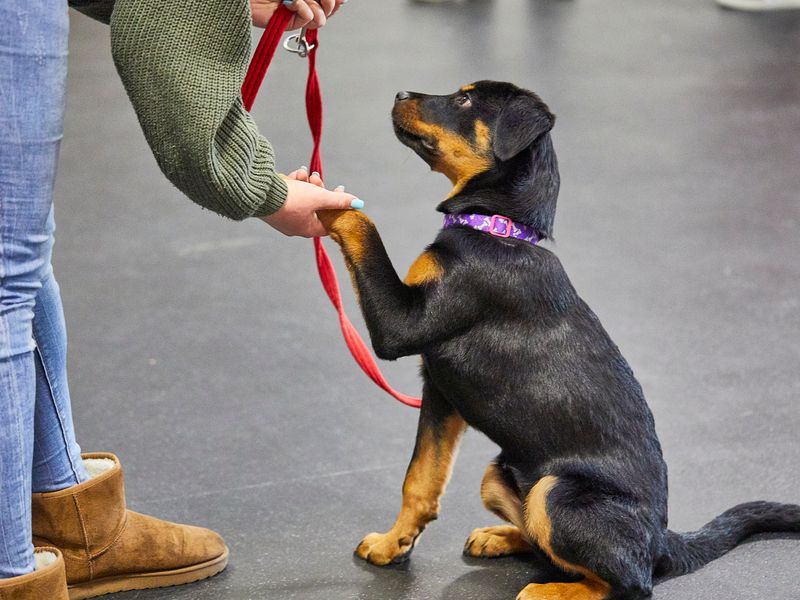Dog Training Strategies to Solve Common Behavior Problems
Dog Training Strategies to Solve Common Behavior Problems
Blog Article
The Ultimate Guide to Canine Training: Transform Your Pet dog's Actions
Effective pet training is essential for fostering an unified connection in between animals and their owners. This guide not only aims to outfit you with the required devices to transform your canine's habits but also invites you to explore just how these fundamental principles can lead to a much deeper connection with your pet dog.
Comprehending Canine Behavior
Understanding pet dog actions is crucial for effective training and a harmonious connection between dogs and their owners. A dog's behavior is influenced by a combination of genes, setting, and experiences. Dog training. Identifying these elements allows owners to customize their training approaches to fulfill the specific requirements of their pets
Canines connect primarily with body movement, articulations, and face expressions. For example, a wagging tail can show exhilaration or joy, while a put tail might signify concern or submission. Observing these hints allows proprietors to react appropriately, enhancing favorable habits and attending to unfavorable ones successfully.
Furthermore, understanding the social framework of pets can supply insights right into their behavior. Pet dogs are pack animals, and they flourish in an organized atmosphere. Developing constant rules and clear borders can prevent complication and promote a feeling of safety.
Moreover, acknowledging the all-natural impulses of dogs, such as need to go after or dig, is crucial. These impulses can be rerouted with ideal outlets, such as play or exercise. By adequately understanding these behavior elements, owners can cultivate a positive training experience, eventually bring about a well-adjusted and obedient canine friend.
Important Educating Strategies
Efficient pet dog training counts on a variety of vital strategies that can dramatically improve the discovering procedure for both the owner and the pet. One fundamental technique is positive reinforcement, which includes satisfying preferable behaviors with treats, praise, or playtime. This technique motivates pet dogs to duplicate the actions that lead to positive outcomes, fostering a relying on partnership in between the pet dog and proprietor.
An additional trick strategy is uniformity in commands and assumptions. Utilizing the exact same verbal signs and hand signals helps the pet dog comprehend what is called for, lowering complication and advertising quicker learning. In addition, developing clear boundaries and guidelines is critical for efficient interaction.
Socializing is additionally an important component of training. Revealing pet dogs to various environments, people, and other pets aids them establish suitable social skills and minimizes stress and anxiety in unknown circumstances.
Finally, patience and timing are essential. Training sessions need to be quick yet regular, making sure that the pet dog remains involved and receptive. By using these crucial methods, owners can develop a structured and favorable training experience that advertises etiquette and reinforces the bond with their canine companions.
Developing an Educating Arrange
How can a well-structured training schedule boost a canine's understanding experience? A training timetable offers consistency, ensuring that pet dogs receive routine, focused direction. This predictability assists pets understand what is anticipated of them, reinforcing their knowing and permitting for far better retention of commands and behaviors.
When producing a training timetable, it is necessary to consider the pet's age, breed, and specific temperament. Young pups might benefit from much shorter, much more regular sessions, while grown-up pet dogs might love longer, much less regular training durations. Integrating a selection of tasks can additionally keep the sessions engaging, stopping dullness and look at this now promoting excitement for discovering.
In addition, organizing training sessions at specific times of the day can help solidify a routine. For example, coupling training with day-to-day strolls or play can create a positive organization with discovering. It is also vital to include time for reinforcement, such as treats or appreciation, to award desired actions immediately.
Last but not least, adaptability is vital. While uniformity is essential, being versatile to the dog's state of mind or power degree can improve their discovering experience. A well-crafted training timetable eventually lays the foundation for efficient interaction and a stronger bond between the pet dog and owner.
Common Training Obstacles
Regardless of having a well-structured training timetable, pet dog owners typically experience numerous difficulties throughout the training procedure. One usual concern is inconsistency in cues and commands. When numerous relative make use of different terms or tones, a canine may become confused, preventing its capacity to find out effectively.
One more constant obstacle is distraction. Dog training. Pets are naturally curious creatures, and external stimulations such as various other pets, sounds, or individuals can divert their interest during training sessions. This needs proprietors to produce a regulated setting or gradually present diversions to reinforce focus
Furthermore, differing energy levels can influence training results. High-energy pet dogs may struggle to calm down and focus, while more easygoing breeds might require extra motivation to involve. Customizing the training technique to fit the private pet dog's temperament is essential for success.

Building a Strong Bond
A strong bond in between a canine and its owner is important for effective training and total well-being. Dog training. This relationship promotes trust fund, which is important for efficient communication throughout the training procedure. When a dog feels protected and connected to its owner, it is more likely to respond favorably to signs and commands
To construct this bond, uniformity is key. Developing a regimen that includes routine feeding, workout, and training sessions helps create a feeling of security. Additionally, favorable support methods, such as treats, appreciation, and play, strengthen preferred habits while strengthening the emotional link.
Socializing is another important element of bond-building. Revealing the original source your pet dog to various atmospheres, people, and other animals aids them feel a lot more comfy and confident, enhancing the bond with their owner. Involving in activities together, such as walking, playing fetch, or participating in obedience training, promotes team effort and common pleasure.
Final Thought

Understanding pet dog behavior is vital for reliable training and an unified partnership between pet dogs and their proprietors.Reliable canine training counts on a variety of essential strategies that can substantially boost the learning process for both the dog and the proprietor.Despite having a well-structured training timetable, pet dog proprietors usually experience numerous obstacles throughout the training procedure.In conclusion, effective pet training relies on an extensive understanding of canine habits, the application of vital techniques, and the facility of a structured training schedule. By stressing positive support and uniformity, pet proprietors can substantially boost their pet dogs' habits, ultimately making certain a harmonious connection and advertising the wellness of both the dog and its setting.
Report this page